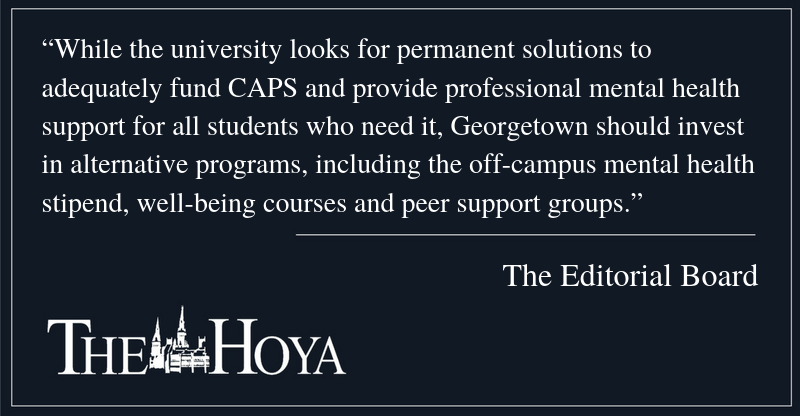As stress and other mental health concerns continue to affect students on campus, Counseling and Psychiatric Services remains woefully underprepared and many students lack access to the mental health care they deserve from Georgetown University.
Georgetown should, in addition to allocating greater resources to CAPS, invest in other mental health support systems such as off-campus therapy stipends, student well-being courses and student groups dedicated to peer counseling.
CAPS is currently unable to provide individualized mental health care for many students because of high demand for their services and insufficient staff, as The Hoya’s editorial board noted in January. Last year, CAPS at times had a wait time of two to three weeks, according to CAPS Director Phil Meilman.
Nine months later, CAPS still lacks sufficient staff to provide adequate mental health care for students. After years of student calls for greater resources, Georgetown must prioritize building up support systems that are both sufficient and accessible for students.
As the university looks to address issues of mental health, however, better funding for CAPS is only part of the solution. Georgetown should expand its off campus therapy stipends program, which helps students finance visits to off-campus mental health care providers.
In February 2018, after sustained activism from students, the university allocated $10,000 to pilot an off-campus therapy stipend program. A committee of three health care professionals administer the fund to students with demonstrated financial need.
Six months after the pilot’s launch, Georgetown now has two funds, one for graduate students and one for undergraduates, according to Meilman. The university should continue to help students access professional counseling by continuing to provide funds for the off-campus mental health stipend.
Moving forward, the administration should increase funds to the stipend to allow all students, regardless of socioeconomic class, to access professional counseling. Additionally, Georgetown should advertise this option and encourage students to use it.
In conjunction with bolstering mental health funding, Georgetown should also strengthen existing programs, such as classes and student groups, to provide diverse options for mental health support.
Last year, Georgetown’s Health Education Services first piloted “Intro to Hoya Studies: Thriving at Georgetown,” a noncredit course aimed at helping students navigate the stressful environment at Georgetown.
The students who took the course enjoyed it, and many students have expressed interest in taking the course for credit, and HES is exploring that option for the future, according to HES Director Carol Day.
Last fall, the university also launched “Mastering the Hidden Curriculum,” a course designed to help low-income, first-generation students deal with stress at Georgetown.
Courses like these can be an effective means to teach students techniques to handle stress and other mental health issues. Georgetown should continue improving the programs and offer more sections so more students can benefit from access to systematic education on how to navigate the Hilltop.
The university should also help advertise student groups that have a mission of providing peer mental health support. Project Lighthouse, a student group created in consultation with CAPS and HES, provides a platform for students to speak anonymously to their peers. With more university support and advertising, Project Lighthouse will be able to expand its network of peer support.
While the university looks for permanent solutions to adequately fund CAPS and provide professional mental health support for all students who need it, Georgetown should invest in alternative programs, including the off-campus mental health stipend, well-being courses and peer support groups.














